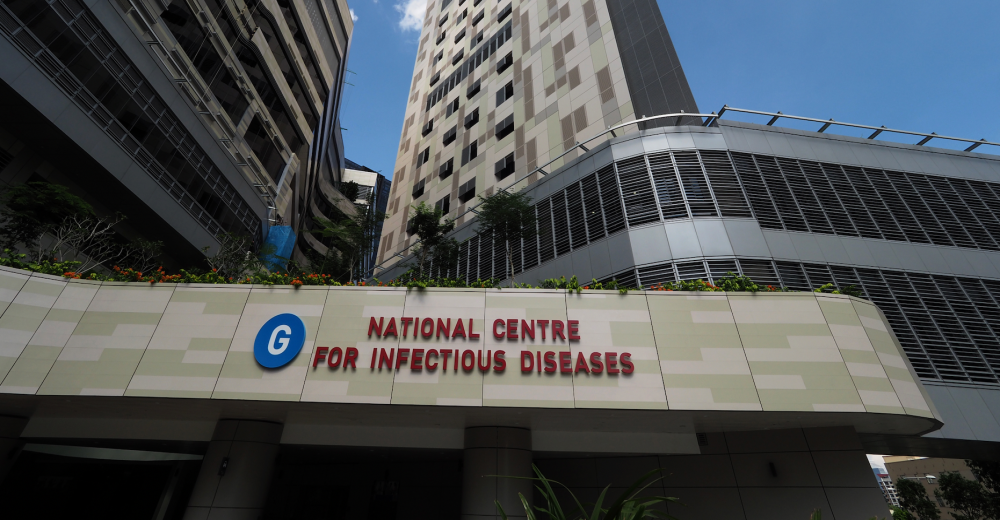Follow us on Telegram for the latest updates: https://t.me/mothershipsg
A director at the National Centre for Infectious Diseases (NCID) urged the public to be "aware and alert" about false claims on Covid-19 vaccinations in a strongly-worded post on his personal Facebook page on June 7.
David Lye, who oversees NCID's Infectious Disease Research and Training Office, explained that he was making the post in response to the recent circulation of messages and petitions which discourage Covid-19 vaccination for children and teenagers, and which advise alternative treatments even though they are not clinically proven.
In his post, Lye expressed his disappointment towards doctors who circulated such messages.
Lye said that doctors are "well-respected in our society", and should not quote "dubious international experts and research", as this could potentially mislead the public and influence them to avoid getting vaccinated against Covid-19.
He also addressed claims about the Sinovac vaccine and its relative effectiveness against mRNA vaccines.
Children and teenagers should be vaccinated
Lye expressed distress about messages and petitions urging against vaccinating children, saying that he "suffered insomnia" over them.
With the latest roll out of vaccines for students aged 12 and above, more and more teenagers will be receiving their vaccination.
Lye noted that this group tends to have less severe symptoms after contracting the virus.
However, the importance of vaccinating children and teenagers is that if they are infected, they can spread it to adults, including those with poor immunity, Lye explained.
Lye also cited studies from the United Kingdom, saying that the Pfizer-BioNTech and AstraZeneca vaccines were found to have reduced household transmission by 50 to 60 per cent.
Doctors had advocated for unproven treatments instead of vaccination
Lye also took a stand against unproven treatments for Covid-19, saying that some doctors had advocated these treatments instead of vaccination.
These include ivermectin, a medication used to treat parasitic infections; and fluvoxamine, an antidepressant.
Ivermectin has not been proven to be effective in Covid-19, Lye said, raising issues with research in favour of its use:
"Among others, evidence cited for ivermectin in Covid-19 virus included the faked database company called Surgisphere which led to two journal retractions from the prestigious New England Journal of Medicine and Lancet in 2020."
Lye also highlighted a "large trial" conducted at a dormitory in Singapore by National University Hospital doctors, which found that ivermectin was not effective in preventing Covid-19.
mRNA vaccine as one of the most effective vaccinations
Lye also stated that some are "demanding that our government stop mRNA vaccines and use Sinovac".
mRNA vaccines are a new type of vaccine to protect against infectious diseases.
According to the Centre for Disease Control and Prevention, mRNA vaccines teach our cells how to make a protein that triggers an immune response inside our bodies. That immune response, which produces antibodies, is what protects us from getting infected if the virus enters our bodies.
Both vaccines in use in Singapore, the Pfizer-BioNTech and Moderna vaccines, are mRNA vaccines.
Lye cited figures about the effectiveness of mRNA vaccines, saying that they can reduce symptomatic Covid-19 infections by 95 per cent, reduce hospitalisation for severe Covid-19 by more than 90 per cent, and prevent transmission by more than 60 per cent.
mRNA vaccines effective against different strains of Covid-19
He also said that mRNA vaccines have proven to be effective against different strains of the virus.
The mRNA vaccines are 93 per cent effective against the UK B117 variant, 75-90 per cent effective against the South African B1351 variant, and 88 per cent effective against the B1617.2 variant.
He also noted that some doctors have claimed that the Sinovac vaccine is superior to mRNA vaccines against variants, but refuted these claims by citing laboratory studies which showed that Sinovac may not work well for the Brazilian B1128 and South African B1351 variants.
For now, there is hardly any data on the effectiveness of Sinovac vaccine against Covid-19 variants, Lye said.
In addition, Lye said that there is little data to confirm that the Sinovac vaccine is effective against the B1617.2 variant, and there is other data that suggests that it is less effective against other variants.
All vaccines developed rapidly, not just mRNA vaccines
These doctors also claimed that mRNA vaccines were developed in a rush, Lye said.
He countered by saying that all Covid-19 vaccines have been developed rapidly.
He explained that vaccines are a huge investment by governments and companies, involving many volunteers in clinical trials.
These trials could be completed rapidly, Lye said, pointing out that, the vaccines developed by Sinovac and Sinopharm were approved in China before the trials were completed.
He added that with strong ties between Singapore and China, there was no reason why Singapore would not approve the Sinovac vaccine.
Regardless, Lye pointed out that approval would depend on "adequate data", adding that the Health Sciences Authority (HSA) is still awaiting reply from Sinovac on its queries on the vaccine.
Lye said that doctors, who hold opposing views on vaccinations, are "pressuring HSA to ignore [the] rigorous review process", even though the eligibility criteria for mRNA vaccines have recently been relaxed to allow most to be vaccinated.
"Be aware and alert of fake science on social media"
Lye concluded his post by warning against "highly active" anti-vaccine groups from Singapore and overseas, and urged members of the public to "be aware and alert of fake science on social media."
Top image via National Centre for Infectious Diseases.
If you like what you read, follow us on Facebook, Instagram, Twitter and Telegram to get the latest updates.
